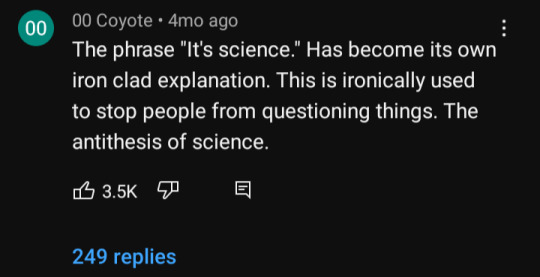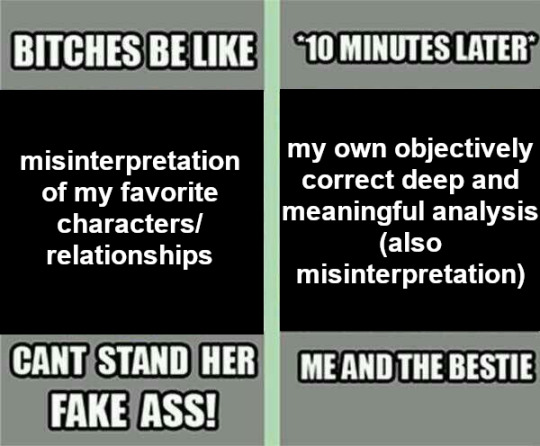#WorldViews
Text
I just realized there’s a fundamental difference in people I do and don’t feel comfortable around. It has to do with the way they interpret the world.
The ones I don’t feel comfortable around, are usually people older than me, but that is not what I take issue with; it’s their manner of speaking to me. These people will speak their views of world as if it’s final, the only correct way to think They will also attempt to force this view of the world on you, with the complete assurance that you will. If you try to correct them, they’ll respond with almost a threat in their voice if you don’t immediately comply and validate that you agree. Their values, the ‘old values’, are the only ones that are true, and they don’t wait to see if you think differently, they’ll state it as if it was a timeless fact and dare you to confront them on it. I will sometimes, carefully, try to point out inaccuracies or research that has proven it wrong - and they’ll fight me on it.
For instance, I’ve had an elderly person complain to me about the ‘today’s youth’ and ‘how they’re ruining everything’. The problem was that the children in the park were loud, and sometimes, they would see teenagers late at night in the park, and they assumed these teenagers were doing drugs (can’t confirm if this is true). The elderly person got upset, yelled, and insisted it would all be better if some physical violence was thrown at those children. I couldn’t listen to that kind of line without interfering, so I pointed out, hey, that would only make the children more likely to become mentally unhealthy, depressed, and learn that the violence is the only rule in life. I also pointed out that even if the teenagers in the park were doing drugs, they cannot be the source of the problem; after all, they’re not the ones who invented drugs, or circulated it here, or would be easily able to buy them; it was the older generations that created this problem, and gave them to the teenagers. The elderly person pretended not to hear any of it, and stuck to their original opinion, while now seeing me as the enemy. After all, if I didn’t conform to their worldview, I was the problem, one of those who need to ‘get some common sense’ and be ‘persuaded’. Because blaming kids and teenagers on problems created by the older generations, is the only way they can keep seeing themselves and their contribution to the world, in a positive light. The only way to keep control.
The other type of person is the one who doesn’t attempt to enforce their worldview on you, instead they try to see where you’re at. They’ll tell you what they think, add ‘at least that is how I see it’, and then ask you ‘What’s your view on this? What do you think?’
Sometimes we’ll find pretty soon that our views differ, and we’ll agree to disagree and talk about something else. Sometimes, we’ll display our information, how we know it, and offer arguments that lead us to believe what we do, sometimes we’ll have little anecdotes to tell. Sometimes we’ll find out some new information, be encouraged to research it, and come back to revisit the subject in order to decide on a new, more informed standpoint. Sometimes we’ll find out we’re completely on the same page, and then be glad to have found out. But we don’t assume. We don’t see each other and go ‘yes, this person I don’t yet know perfectly, must have the exact stance on every issue in the world, they must have this specific information and subscribe to the same ideas and thoughts’, because that is presumptive, rude, and creating impossible expectations.
I wonder if the first kind are people who shared their perception of the world with their entire generation, and then project that idea on the entire world, believing those who disagree can only be blind and stupid? And in that case, assuming someone would disagree, is the same as assumption they’re lacking in intellect? My generation has vastly different views on everything, I can find people my age who disagree with my every view, and people younger than me who agree with me. I can’t assume for anyone that they would adapt my views, but I also can’t assume them clueless, because we all form our view based on information we gather thru life, and different people will have different information and experiences at their disposal. So it’s necessary to not assume, to find out where people stand, and then meet them where they’re at.
#worldviews#difference in perspective#generational gap#millenials#i don't even know what generation that elderly person was#they're 89 at this point#thats before boomers i think
150 notes
·
View notes
Text
Exposing Scientific Dogmas: Rupert Sheldrake's Banned TED Talk
The talk was reshared again in a video by the YouTube channel "After Skool." It was based on his book The Science Delusion.
Here are the 10 Scientific Dogmas he listed (which could prevent science from greater discoveries and true scientific thinking since they create the default worldview of people worldwide):
#1 Nature is mechanical
#2 Matter is unconscious
#3 The laws of nature are fixed
#4 The total amount of matter and energy is always the same
#5 Nature is purposeless
#6 Biological hereditary is material
#7 Memories are stored inside your brain as material traces
#8 Your mind is inside your head
#9 Psychic phenomena like telepathy are impossible
#10 Mechanistic medicine is the only kind that really works

#txt#exposing scientific dogmas#rupert sheldrake#scientific materialism#materialism#science#mindful consumption#mindful living#mindfulness#mindsets#dogma#paradigms#worldviews#philosophy of science#unlearning#laws of nature#autodidact#food for thought#groupthink#thought experiment#genetics#sidewalkchemistry
54 notes
·
View notes
Text
This might be a wild take but I actually think it’s important that multiple ideologies and worldviews be present throughout major levels of society because no matter how nice your theory or whatever is there will always be biases and potential harm within any ingroup, including (perhaps especially ideological ones)
That doesn’t mean all viewpoints are equal, but it does mean constantly chasing after the one true good ideology that can solve all our problems usually just means ignoring and covering up the inconvenient issues at best (and also tends to just create fuel for the movements you really don’t want)
22 notes
·
View notes
Text
If you lie down with dogs with fleas, you'll get fleas. Hence the company you keep will effect and influence you so be cautious about who you associate yourself with on a constant basis.
I'm not saying you can't hang out with that friend you care about so much and wish to see them better. But what I am saying is that of you involve yourself with them all the time in their actions, it will start to corrode you.
I would also like to add that if you are a friend with a unbeliever and you look at them as a project to get to Christ instead of a person who needs Christ, you need to take a step back and think real hard about that cuz that's gross.
6 notes
·
View notes
Text
"In this regard Buddhism seems to have anticipated the more recent and reluctant conclusions of psychoanalysis: guilt and anxiety are not adventitious but intrinsic to the ego. Anatta suggests that our dukkha ultimately derives from a repression even more immediate than death-fear: the suspicion that I am not real. For Buddhism, the ego is not a self-existing consciousness but a fragile sense of self that suspects and dreads its own no-thing-ness. This third type of dukkha motivates our conditioned consciousness to try to ground itself — that is, I want to make myself real. Since the sense of self is a construct, however, it can real-ize itself (or rather, try to realize itself) only by objectifying itself (securing itself as an object) in the world. That makes the ego-self, in effect, a never ending project to objectify itself in some way — something that, unfortunately, our conditioned, ever changing consciousness cannot do, anymore than a hand can grasp itself or an eye see itself.
The consequence of this perpetual failure is that the sense of self is shadowed by a sense of lack. What Freud called 'the return of the repressed' in the distorted form of a symptom links this basic yet hopeless project with the symbolic ways we try to make ourselves feel real in the world. We experience this deep sense of lack as the feeling that 'there is something wrong with me,' yet that feeling manifests, and we respond to it, in many different ways: I'm not rich enough, not loved enough, not powerful enough, not published enough (for academics!), and so forth. Our root anxiety is eager to objectify into fear of something, because then we have particular ways to cope with particular feared things. The difficulty, however, is that no objectification can ever satisfy us if it is not really an object we want.
In this way Buddhism shifts our focus from the terror of death (our primal repression, according to Becker) to the anguish of a groundlessness experienced here and now. The problem is not so much that we will die, but that we do not feel real now. If so, what does this third type of dukkha imply socially? Is there a communal version of sankhara-dukkhata? In Escape from Evil Becker argues that society is a collective immortality project. Can it also be understood as a collective reality project, a group effort to ground ourselves?... An affirmative answer casts a somewhat different light on the loss of our sacred canopies. If religious worldviews provide us with transcendentally validated projects that promise to make us real (i.e., various types of supernatural salvation), the decline of faith in such collective canopies can only lead to more more frantic and desperate attempts to real-ize ourselves."
- David Loy, from The Great Awakening: A Buddhist Social Theory, 2003.
#david loy#quote#quotations#zen#buddhism#psychology#self#no self#anatta#identity#anxiety#sunyata#postmodernism#anthropology#worldviews#psychoanalysis#dukkha#social constructs#ethnography
5 notes
·
View notes
Text
Writing from Scratch #85: Avoidance, Part 2
Writing from Scratch is a weekly blog series that brings writing back to the basics. #writing #writingadvice
How a Character Solves a Problem: Avoidance, Part 2
Writing from Scratch is a weekly blog series that takes writing back to the basics. Each week we’ll build on what we’ve learned before to craft our stories.
Go to index. Go to Volume I, Issue 1. Go to Volume II, Issue 1. Go to Volume III, Issue 1. Go to Volume IV, Issue 1. Go to Volume V, Issue 1. Go to previous post.
How a Character Solves a Problem: Avoidance, Part 2
Avoidance and Stakes
I…
View On WordPress
#beliefs#character creation#Chidi Anagonya#desires#fears#Obi-Wan Kenobi#objectives#plot#stakes#superobjectives#The Good Place#try-fail cycles#worldviews#writing#writing about writing#writing advice
2 notes
·
View notes
Text
Stay Informed on World Events! These are Headlines You Can't Miss! Explore the Latest Developments and Stay Connected with important News!
#EuropeNews#WorldNews#BreakingNews#GlobalUpdates#LatestNews#TopStories#InternationalNews#EUUpdates#WorldEvents#CurrentAffairs#GlobalNews#EuropeanUnion#WorldPolitics#EuropeToday#WorldAffairs#GlobalIssues#EUHeadlines#WorldUpdates#EuroNews#WorldWatch#GlobalDevelopment#EUInsights#WorldViews#EuropeInsider#GlobalTrends#EUAffairs#WorldLeaders#EuropeFocus#GlobalCoverage#EuropeanNews
0 notes
Text

guys i don't think we can put him on our back
#ever since i learnt how big this man was my entire worldview had been shattered#dogday enjoyers better start hitting the gym#my art#sitruuna-art#fanart#poppy playtime#poppy playtime 3#poppy playtime chapter 3#poppy playtime fanart#smiling critters#dogday#player#poppy playtime player#poppy playtime dogday#high quality shitpost#click for higher quality#artists on tumblr
7K notes
·
View notes
Text

Every Taylor Swift song
#I truly truly cannot empathize with anyone in limerence with her in fact it feels betraying.#all of the interesting beautiful art in the world and the only thing you can blow up is another implicitly conservative value white woman?#having to write narratives about her hypothetical dykeishness to feel comfortable with that dissonance? as if that would even absolve her#it’s not that I hate Taylor I just hate this unwillingness to engage with where her worldview has serious limitations and it seeps#throughout her discography. I think loving art comes with being able to recognize where it fails#what politics are present in it. it’s not deep it’s not subtext it’s all just right there
4K notes
·
View notes
Text
Hidden Worldviews (book review)
Title: Hidden WorldviewAuthor: Steve Wilkens and Mark L. SanfordPublisher: InterVarsity PressPages: 218
Hidden Worldviews
The authors, Steven Wilkens and Mark L. Sandford, of this book begin by describing what makes a worldview a worldview. They state the often people look at certain major worldviews, but miss what the common worldviews are that are very seldom seen as a worldview, though held…

View On WordPress
#biblical worldview#Book Review#consumerism#Hidden Worldview#individualism#Intervarsity Press#Mark L. Sanford#moral relativism#nationalism#new age#postmodern tribalism#salvation by therapy#scientific naturalism#Steve Wilkens#worldviews
0 notes
Text
Elephantapperception.com
0 notes
Text
If people make cutesy posts about growing food and herb spirals and composting but never talk about stuff like preventing and getting rid of rats in a garden, I get this suspision that they either haven't actually gardened much or they're more interested in presenting an aesthetically pleasing image than in actually preparing people to deal with a garden.
#Like the unrealistic gun hoarding bunker doomsday preppers of gardening#but instead of imagining a world without rules and community they imagine a world without rats and mold and plant virusses#Which is a better worldview than those preppers but not a more realistic one.
5K notes
·
View notes
Text
Why Choose Christianity?
There are many people asking why they should choose Christianity out of the 1,000s of worldviews presented to them in the world. Here is why.

View On WordPress
#andrew paul#apologetics#bible study#choose#Christian#Christianity#church#commentary#counter cultural#free#in the Bible#religions#Sermon#why#world religions#worldviews
0 notes
Text
Warning to all Christians, do not talk about Pride Month during June. I know you’ll be tempted too but it’s a trap. Since the Left’s mission is to destabilize everything and usher in Marxist ideology, if we talk about Pride Month -- we will giving them more press. All press is good press. No talk, no press.
It deprives them of the attention they want and the ammunition needed to label Christians contrary to what we believe in.
What did Christ say? “Be gentle as doves but wise as serpents”. We are to be kind, compassionate and loving but we are also to be truthful and exert caution when need be.
That means being aware of things happening and acting accordingly, not feeding into the cycle but rather look behind the curtain and attack the problem at their corruptible roots.
I try to go for the ideologies jugular, and free those who have been made useful pawns to said ideology. I don’t like seeing people being duped, wither by false Christians and teachers or ideologies that binds people into worldviews of meaningless.
8 notes
·
View notes
Text
"Once one becomes aware of the difference between nature and culture, one can never recover the unselfconscious groundedness that, for better and worse, has been lost. Both individually and collectively, the freedom to determine one's own path is shadowed by an anxiety-producing loss of security due to the disappearance of one's transcendental foundation — a sacred canopy that, whether or not it actually protects us, answers our deepest questions about the structure and meaning of the universe, and where we fit into that. Such answers do more than validate and stabilize the social order. Internalized, they also provide personal identity, a secure grounding for the self. When I accept my culture as natural and therefore inevitable, the meaning of my life is more or less decided for me. But when I accept the freedom to construct my own meaning, I experience a vertigo resulting from the lack of an external — that is, a natural-ground."
- David Loy, from The Great Awakening: A Buddhist Social Theory, 2003.
#david loy#quote#quotations#anthropology#ethnography#social constructs#worldviews#meaning#self#no self#anatta#postmodernism#vertigo#buddhism#zen
3 notes
·
View notes
Text

#🐉#this is what i love about being involved in community spaces for fiction though tbh#everyone has different personalized interpretations of the source material and some of them align with my own or make me go 'oh huh i never#thought of that but yeah i can see it' while some of them just dont compute at all and make me wonder if we saw the same thing#which of course. we didnt. or rather we saw the same objective source material but we *saw* it completely differently through the lens of#our own experiences and worldview.#its so cool#however i will sometimes be a hypocritical little hater about it
10K notes
·
View notes